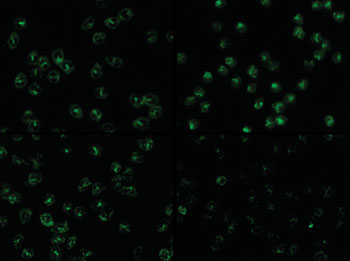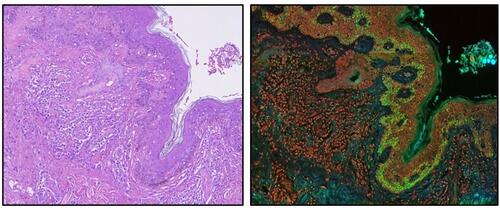Monitoring ANCA Levels Helps Predict Relapse of Systemic Vasculitis in Patients with Kidney Involvement
By LabMedica International staff writers
Posted on 29 Oct 2014
Repeated measurement of levels of anti-neutrophil cytoplasmic antibodies (ANCA) predicts likelihood of relapse in patients suffering from systemic vasculitis with kidney involvement.Posted on 29 Oct 2014
Anti-neutrophil cytoplasmic antibodies are a group of autoantibodies, mainly of the IgG type, against antigens in the cytoplasm of neutrophil granulocytes (the most common type of white blood cell) and monocytes. They are detected by a blood test in a number of autoimmune disorders, but are particularly associated with systemic vasculitis. The antibodies produced by patients with ANCA-associated vasculitis can damage blood vessels, and relapses of the disorder can cause severe and permanent damage to organs and other parts of the body.

Image: Immunofluorescence staining pattern of ANCA using FITC conjugate demonstrates presence of antineutrophil cytoplasmic antibodies (ANCA). Top left - PR3 antibodies on ethanol-fixed neutrophils showing a cytoplasmic ANCA pattern. Bottom left - PR3 antibodies on formalin-fixed neutrophils showing a cytoplasmic ANCA pattern. Top right - MPO antibodies on ethanol-fixed neutrophils showing a perinuclear ANCA pattern. Bottom right - MPO antibodies on formalin-fixed neutrophils showing a cytoplasmic ANCA pattern (Photo courtesy of Wikimedia Commons).
Although the value of measuring ANCA during follow-up to predict a relapse has been controversial, investigators at Maastricht University (The Netherlands) postulated that measuring ANCA could be useful in patients with renal involvement but would be less valuable in patients with non-renal disease.
To test this theory, they monitored PR3-ANCA and MPO-ANCA levels in 166 consecutive patients with ANCA-associated vasculitis who were positive for either proteinase 3 (PR3)-ANCA or myeloperoxidase (MPO)-ANCA. Among the study group were 104 patients with kidney problems associated with the disease and 62 without.
During the follow-up period that averaged 49 months and included an average of 18 additional ANCA measurements, increase in ANCA levels was seen in 89 patients and 74 relapses were recorded. ANCA rises correlated with relapses in patients who presented with renal involvement but in comparison, associated only weakly with relapses in patients who presented with non-renal disease.
“By measuring ANCA levels in patients with kidney involvement, doctors can predict which patients are going to relapse. It is expected that by using ANCAs as a guideline, severe relapses necessitating dialysis can be prevented,” said senior author Dr. Jan Willem Cohen Tervaert, professor of medicine and immunology at Maastricht University.
The study was published in the October 16, 2014, online edition of the Journal of the American Society of Nephrology.
Related Links:
Maastricht University













